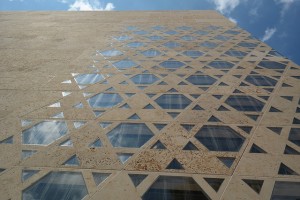 In our running commentary on the prayers we have reached the blessing that leads into the recitation of the Sh’ma. It is a very beautiful blessing, full of emotion. It’s first word tells of its theme: Love. And not merely any love, but, rather – “a great love! – ahavah rabbah!”
In our running commentary on the prayers we have reached the blessing that leads into the recitation of the Sh’ma. It is a very beautiful blessing, full of emotion. It’s first word tells of its theme: Love. And not merely any love, but, rather – “a great love! – ahavah rabbah!”
We acknowledge that we have been showered with a great love from God, a great love that is characterized further as expressing “great and surplus compassion.” How has this love been manifest? The blessing does not thank God for liberating us from slavery or for performing miracles for us. God’s love is bestowed upon us through the ongoing investment God has shown in teaching our past generations “laws for living.” In recognition of this legacy of love through instruction, we implore God to “likewise be gracious to us and teach us.”
But why should we have to pray for this when God has already been quite explicit about what the rules of life comprise. Hasn’t the message already been conveyed?
There are two fundamental responses to this question, both of which underlie the essential message of our blessing. One response is that what must be constantly renewed is the very emotion celebrated by our blessing – the emotion of love. Reb Zalman Schachter-Shalomi was wont to point out that, in the context of a loving relationship between two people, the repetition of the declaration, “I love you!” is not important because it conveys any new information. What do we gain by saying these same words again and again? It is not knowledge of some new data that is gained, but the very love, itself, that the relationship depends upon. It is that love that is gained, gained through the “surplus” repetition of its truth. This is one answer to the question of why we should pray the traditional, repetitious prayers of our siddur. Imagine saying to someone you really love, “I will no longer repeat myself by telling you I love you. I have said it once and that’s final!” What would happen to the relationship? What would happen to the love?
Another, complementary response is that love itself lives by being renewed in manifold ways. This means that new avenues of loving need to be developed. Sometimes this results from the deepening of our engagement in what we already know and do. As a person who prays regularly and who studies the same portions of the Torah over and over, I can testify to the unending capacity of our tradition to offer new experiences, insights, and fresh challenges all the time. And when such love thrives it serves, as well, as a grounding for renewal and surprise.
Our synagogue community was created to make sure there would be a central space to celebrate this love, to continually renew this love and to ensure the transmission of this love. It has stood for generations – 110 years, so far. And now we have endeavored to renew our sense of commitment to this mission. We have studied, discussed, researched, and argued together and now we are asked to consider adopting a new proposed model for the future vitality of this sacred congregation.
I urge everyone to review the excellent materials about the Sustaining Share Model, materials that have been prepared by so many dedicated volunteers with great love for Shomrei. Think of the mission of this synagogue. Do you want to take part in supporting it? Your response – at the Congregational meeting on May 27th and beyond that date – will determine the future of Congregation Shomrei Emunah.
In the words of our blessing –
May You make our hearts capable of –
Understanding, and of succeeding in implementing our understanding;
Hearing each other, learning from one another, and teaching each other;
So as to preserve, to do and to sustain
All that flows from the study of Your Torah –
with love.
- Toby Stein: In Memoriam - Thu, Feb 8, 2024
- Faithfulness and Hope: Parashat Sh’lach - Thu, Jun 23, 2022
- Past Their Prime: Parashat B’ha`a lot’kha - Thu, Jun 16, 2022
